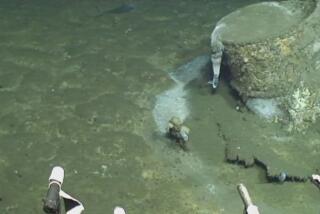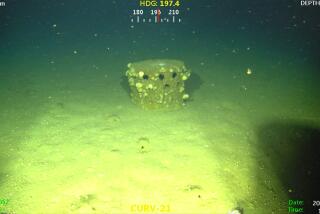40-Year-Old Mustard Gas Bombs : Danish Fishermen Haul In Unwanted Catch
- Share via
ROENNE, Denmark — For more than 40 years, bombs and grenades containing mustard gas have lain beneath the Baltic Sea outside this picturesque island harbor, threatening fishermen who cast their nets into the shallow waters.
Now the Danish government is going ahead with plans to dispose of some of the sunken weapons, dumped after the defeat of Nazi Germany in World War II, by burning them at sea.
“We want a situation in which no gas would be brought on land,” said Jens Brandt, mayor of Bornholm, this small island south of Sweden.
Some environmentalists, however, oppose the plan, fearing pollution.
“Our opinion is that it is illegal, according to international conventions, to burn the gas at sea,” said Kirsten Hansen of Danish Greenpeace.
Captured From Germans
From 1945 to 1948, the Allies ordered 250,000 tons of liquefied mustard gas captured from the Germans dumped into the Baltic. From 36,000 to 50,000 tons were sunk near Bornholm.
The gas is spread over so wide an area that the Danish government rejected the idea of trying to remove the containers from the ocean floor. Instead, it will dispose of the bombs and grenades that are inadvertently caught by fishermen.
A company commissioned by the government last December to devise a disposal plan has recommended a ship-based destruction plant. Containers would be X-rayed to see whether they contain any explosives, which would be separated out. Then the gas and containers would be burned.
“We don’t think we would violate the conventions,” Norman Cleaver, a spokesman for the Environment Ministry, said in response to Greenpeace’s objection.
“What we would burn is already in the sea. We are not taking anything out there to destroy it. It wouldn’t imply any pollution, while taking it on land would expose the population to risks,” he said.
$7-Million Plant
The plant would take two years to build at a cost of $7 million to $12 million, with annual operating expenses of $1.4 million to $2 million.
Before making a commitment, the government is trying to get other Baltic countries to help finance the project. There has been no announcement of when a decision will come.
Mustard gas, which seeps through clothing and can cause blisters, blindness, lung injury or death, was used by both sides in World War I.
Germany continued to make and stockpile it after the war, but military leaders, fearing reprisal in kind, avoided using it during World War II.
No one has been reported killed here by the gas.
Could Leak
However, the gas grenades and aerial bombs on the sea floor have rusted and are liable to leak when hauled up, as fishermen have learned.
“When we got a mustard gas bomb in the nets, we didn’t know what it was,” said Johan Peter Hentze, captain of the trawler Heldarstendur.
“It penetrated all our clothes and boots. We were badly burned, all seven of us, and had to be taken to the hospital by helicopter,” he said.
The situation is particularly serious for Bornholm, because the waters are fairly shallow and a great deal of fishing is done.
“About two tons are fished up every year. It will take 18,000 to 25,000 years until it is over,” said Kristian Andersen, chief of section at the Defense Ministry.
Lost Time for Fishermen
Besides fear of injury, the fishermen’s main complaint is lost time and money spent coping with the gas, despite government subsidies for cleaning and for catches that have to be thrown back.
“The cleaning of the ships is free of charge for the fishermen, but of course it takes some time, one or two days, which is not compensated,” said Gunnar Rasmussen, head of the Bornholm fishermen’s association.
“One day during the fishing season can be worth about $1,400 to $2,800,” he said.
Authorities now keep two men on call around the clock to help fishermen when they get gas in their nets. Most containers are brought on land and then incinerated.
“We have had to learn to live with it, and, by and large, no accidents occur,” said Rasmussen. “You are always on guard against getting something in the trawler that is not normal.”
More to Read
Sign up for Essential California
The most important California stories and recommendations in your inbox every morning.
You may occasionally receive promotional content from the Los Angeles Times.













